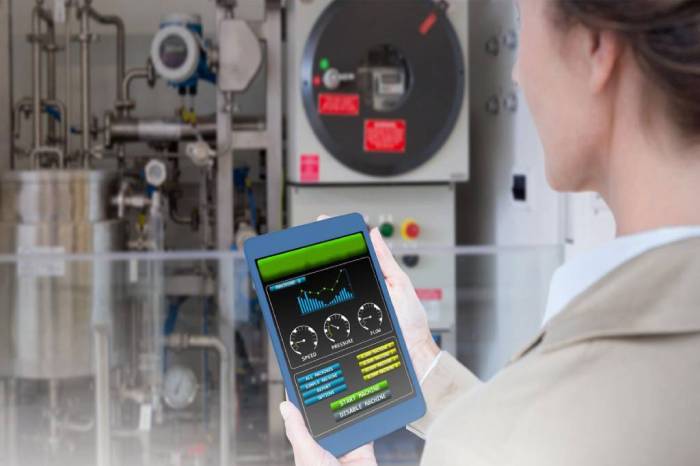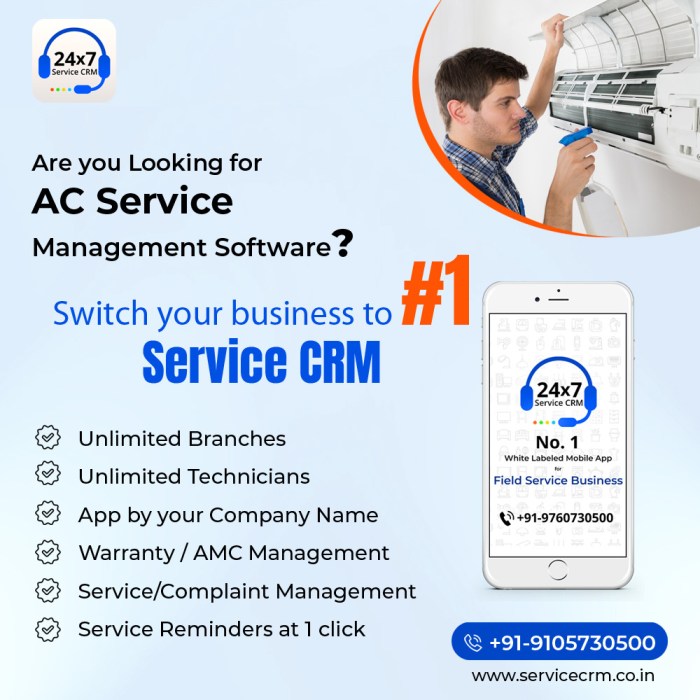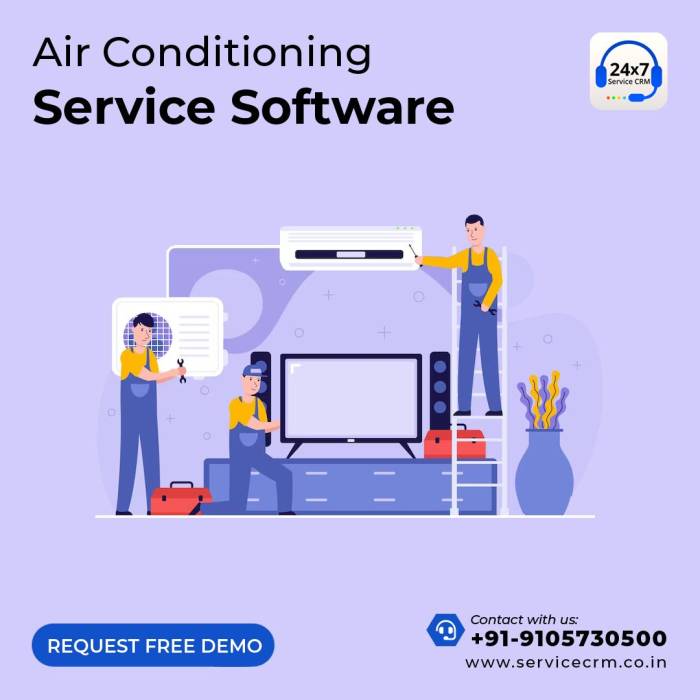Crm software for hvac companies – In today’s competitive HVAC landscape, efficient operations and customer satisfaction are paramount. This is where Customer Relationship Management (CRM) software steps in, offering HVAC companies a powerful tool to streamline processes, enhance customer relationships, and ultimately boost profitability. This comprehensive guide explores the benefits, features, and selection process of CRM software specifically tailored for HVAC businesses.

Source: genicsolutions.com
Why HVAC Companies Need CRM Software: Crm Software For Hvac Companies
HVAC companies, often juggling multiple projects, technicians, and customer inquiries simultaneously, face unique challenges. Traditional methods of managing customer interactions, scheduling, and service history can be cumbersome and prone to errors. A dedicated HVAC CRM system addresses these challenges by centralizing information, automating tasks, and providing valuable insights into business performance. Key benefits include:

Source: tumblr.com
- Improved Customer Service: Track customer interactions, service history, and preferences to provide personalized and efficient service. This leads to increased customer loyalty and positive reviews.
- Streamlined Scheduling & Dispatch: Optimize technician schedules, reduce travel time, and ensure timely responses to customer requests. Real-time visibility into technician availability enhances efficiency.
- Enhanced Communication: Communicate seamlessly with customers through automated email and SMS reminders, appointment confirmations, and service updates. This improves customer satisfaction and reduces missed appointments.
- Increased Sales & Revenue: Track leads, manage sales opportunities, and analyze sales data to identify growth opportunities. Targeted marketing campaigns can be implemented based on customer segmentation.
- Better Inventory Management: Track equipment inventory, parts, and supplies to minimize stockouts and ensure efficient procurement. This reduces downtime and improves operational efficiency.
- Improved Reporting & Analytics: Gain valuable insights into business performance through detailed reports and dashboards. Monitor key metrics such as customer acquisition cost, service call completion rates, and revenue generated per technician.
Essential Features of HVAC CRM Software
While the specific features may vary across different CRM platforms, several core functionalities are crucial for HVAC businesses:
Customer Management, Crm software for hvac companies
- Centralized Customer Database: Store all customer information, including contact details, service history, equipment details, and communication logs in one easily accessible location.
- Customer Segmentation: Group customers based on various criteria (e.g., equipment type, service frequency, location) for targeted marketing and service offerings.
- Automated Email & SMS Marketing: Send personalized messages to customers regarding service reminders, special offers, and promotions.
Scheduling & Dispatch
- Appointment Scheduling: Allow customers to book appointments online and manage technician schedules efficiently, minimizing conflicts and maximizing productivity.
- Real-time Technician Tracking: Monitor technician locations and availability in real-time to optimize dispatch and response times.
- Route Optimization: Plan efficient routes for technicians to minimize travel time and maximize the number of service calls completed per day.
Service & Maintenance Management
- Work Order Management: Create, assign, and track work orders from initiation to completion, ensuring accurate record-keeping and efficient task management.
- Inventory Tracking: Monitor parts and equipment inventory levels, receive automated alerts for low stock, and streamline procurement processes.
- Service History Tracking: Maintain detailed records of all service calls, repairs, and maintenance performed on each customer’s equipment.
Reporting & Analytics
- Customizable Dashboards: Monitor key performance indicators (KPIs) such as revenue, customer satisfaction, and technician productivity through customizable dashboards.
- Sales Reporting: Analyze sales data to identify trends, track sales performance, and identify opportunities for growth.
- Service Performance Reporting: Track service call completion rates, average service time, and customer satisfaction scores to identify areas for improvement.
Choosing the Right HVAC CRM Software
Selecting the right CRM software requires careful consideration of your specific business needs and budget. Factors to consider include:
- Scalability: Choose a system that can grow with your business, accommodating increasing numbers of customers and technicians.
- Integration Capabilities: Ensure seamless integration with existing software systems, such as accounting software and scheduling tools.
- User-Friendliness: Opt for a system that is intuitive and easy for your team to learn and use, minimizing training time and maximizing adoption.
- Mobile Accessibility: Ensure access to the CRM system from mobile devices for technicians and office staff to enhance productivity and responsiveness.
- Customer Support: Choose a vendor that provides reliable customer support and readily available resources.
- Pricing & Features: Compare pricing plans and features to find the best value for your investment.
Popular HVAC CRM Software Options
(Note: This is not an exhaustive list and specific features and pricing may vary. Always check the vendor’s website for the most up-to-date information.)

Source: medium.com
Many CRM platforms offer solutions adaptable to HVAC businesses, including but not limited to: ServiceTitan, Housecall Pro, JobNimbus, and more. Researching individual platforms and comparing their features against your business requirements is crucial for making an informed decision.
Frequently Asked Questions (FAQs)
- Q: How much does HVAC CRM software cost? A: Pricing varies significantly depending on the features, number of users, and vendor. Expect a range from affordable monthly subscriptions to more substantial enterprise solutions.
- Q: Can I integrate my existing accounting software with an HVAC CRM? A: Many CRM platforms offer integration capabilities with popular accounting software, streamlining financial management.
- Q: How long does it take to implement a new CRM system? A: Implementation time varies depending on the complexity of the system and the size of your business. Expect a period of setup, data migration, and training.
- Q: What are the key performance indicators (KPIs) to track with an HVAC CRM? A: Key KPIs include customer acquisition cost, service call completion rate, average revenue per customer, technician utilization rate, and customer satisfaction scores.
- Q: Is cloud-based HVAC CRM better than on-premise? A: Cloud-based CRMs offer greater flexibility, accessibility, and scalability, often preferred for their ease of use and reduced IT infrastructure requirements.
Conclusion
Investing in the right CRM software is a strategic move for any HVAC company seeking to optimize operations, enhance customer relationships, and drive growth. By centralizing information, automating tasks, and providing valuable insights, a well-chosen CRM system empowers HVAC businesses to improve efficiency, increase profitability, and achieve a competitive edge in the market.
Call to Action
Ready to transform your HVAC business with the power of CRM? Contact us today for a free consultation and let us help you find the perfect solution to meet your unique needs. Explore the available options and choose the one that best aligns with your goals and budget for improved efficiency and customer satisfaction.
Key Questions Answered
What are the key features to look for in HVAC-specific CRM software?
Key features include job scheduling and dispatch, inventory management, service history tracking, customer communication tools (email, SMS), reporting and analytics dashboards, and integration with other business systems.
How much does HVAC CRM software typically cost?
Pricing varies widely depending on the features, number of users, and vendor. Expect monthly subscription fees ranging from a few hundred to several thousand dollars.
Can CRM software integrate with my existing accounting software?
Many CRM systems offer integration options with popular accounting software packages, allowing for seamless data transfer and improved financial reporting. Check for compatibility before purchasing.
How long does it take to implement a CRM system?
Implementation time depends on the complexity of the system and the size of the business. Expect a timeframe ranging from a few weeks to several months.
What kind of training is needed for employees to use HVAC CRM software?
Most vendors provide training resources, including online tutorials, documentation, and potentially on-site training. The learning curve varies depending on the software’s user-friendliness.
